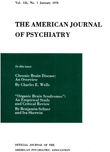PROGNOSIS OF WAR NEUROSES WITHOUT PSYCHOTHERAPY
Abstract
A series of 58 war neurotic enlisted Air Force returnees from overseas theaters routinely admitted to a United States convalescent hospital were observed for one month without specific psychotherapy.
The primary purpose was to determine which patients could be handled without specific psychotherapy and be confidently returned to duty status in an improved condition at the end of hospitalization.
The results were as follows:
1. Of the series, 26 percent fell into the markedly improved group.
2. The principal factors having practical prognostic value in the determination of candidates for this group were:
a. Mild anxiety, in the absence of anxiety-binding mechanisms.
b. Mild predisposition.
c. Combat stress rather than non-combat. It is therefore suggested that in convalescent hospitals treating overseas returnees with neurotic symptoms, a preliminary psychiatric screening be made by psychiatrists experienced in the diagnosis and therapy of war neuroses. By so doing a quarter or thereabouts of the patients may be legitimately treated without utilizing specific psychotherapy. The remainder will require individual psychotherapy with convalescent or occupational therapy as an adjunctive therapy.
Access content
To read the fulltext, please use one of the options below to sign in or purchase access.- Personal login
- Institutional Login
- Sign in via OpenAthens
- Register for access
-
Please login/register if you wish to pair your device and check access availability.
Not a subscriber?
PsychiatryOnline subscription options offer access to the DSM-5 library, books, journals, CME, and patient resources. This all-in-one virtual library provides psychiatrists and mental health professionals with key resources for diagnosis, treatment, research, and professional development.
Need more help? PsychiatryOnline Customer Service may be reached by emailing [email protected] or by calling 800-368-5777 (in the U.S.) or 703-907-7322 (outside the U.S.).



